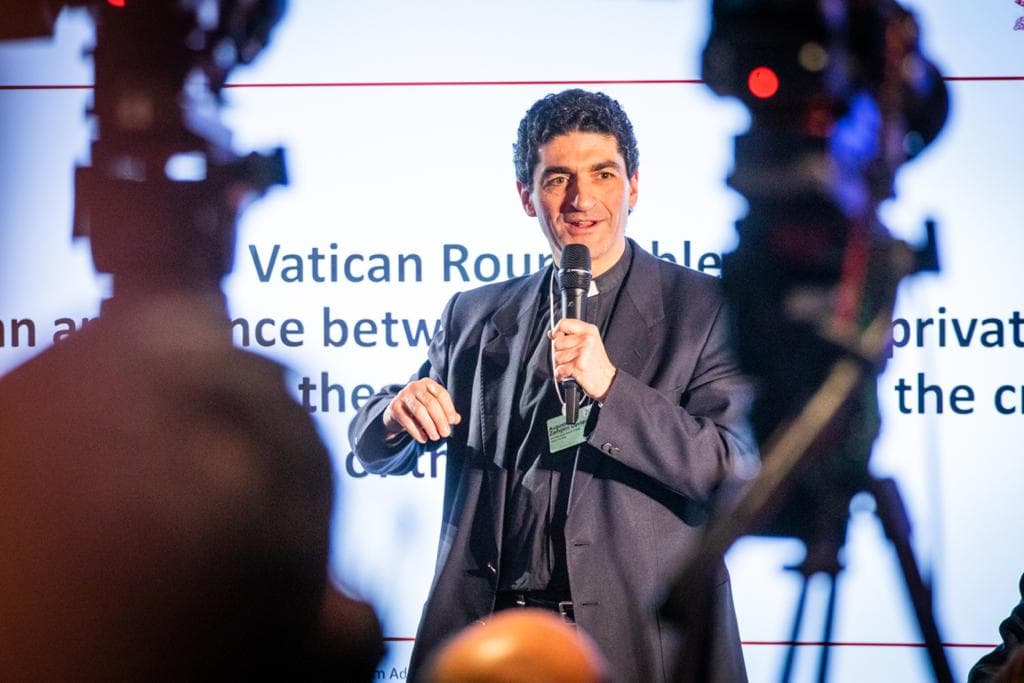ROSARIO, Argentina – Pope Francis believes that the human person is not immune to crises but always impacted by them. Being better or worse after each one, he’s often said, is “up to us.”
With that in mind, the Vatican’s COVID-19 coronavirus crisis task force is identifying what needs to be changed.
“The COVID Vatican commission is trying to answer to the reality we’re living and preparing the future,” said Father Augusto Zampini, one of the heads of the commission. “Preparing the future is different from preparing for the future: That implies the future is already determined and we must buy lifesavers because it’s going to be terrible.”
Preparing the future, he said, means to acknowledge that things look grim, but since it’s not set in stone, it’s worth looking for economic models that will help humanity out of the ongoing crisis — not by going back to a world of inequalities led by an economy that kills, but by creating a fairer world.
“We need a new economic model, not because I say so or because Pope Francis is asking for one,” Zampini said at video conference on Monday. “We need a new model because there’s no alternative. Within the catastrophe of the pandemic [we see] people dying; people sick; countries forced to close because they cannot control the spread of the virus; people growing nervous because they can’t take it anymore; poor people who have to go to work because they don’t receive a salary from either the private or public sectors.”
“Seeing all this calamity, we acknowledge that every crisis is an opportunity to see what’s not working,” the priest said.
His words came at an online panel organized by Father Claudio Caruso, an Argentine, to promote a November 19-21 summit to be held in Assisi called The Economy of Francis.
Caruso leads Cronica Blanca, a civil organization that brings together young men and women to explore the Church’s social teaching. It’s designed to bring together some 4,000 young advanced economics students, managers of social enterprises, Nobel Prize winners and officials from international organizations.
Zampini was recently appointed as adjunct secretary of the Vatican’s Dicastery for Integral Human Development.
RELATED: Assisi summit to focus on pope’s challenge to ‘pathological’ economy
The priest said the virus has exacerbated all the structural failings of the global system, particularly inequality. Everyone is facing the crisis, he noted, but not everyone is on the same boat: Some are in a cruise ship, that might shake a bit, but will be fine. Others, are in a wood raft that they know will sink. In the pandemic, the latter include those who have no access to proper food and clean water; or those with no healthcare.
On the economic level, he added, there are countries that can afford to print money and “rescue” the economy or different companies, while there are others that cannot, and need to ask for high-interest loans, which leads them to “mortgage their future.”
Hence, Zampini says the Vatican COVID-19 commission is bringing together more than 100 institutions and thousands of people to think about a different economy that, if the pandemic is under control next year will lead to a call for a “seven-year conversion.”
This seven-year conversion builds up on the “United Nations Decade of Action,” a call to achieve the Sustainable Development Goals by 2030. The goals are to work to end poverty, rescue the planet and build a peaceful world.
“What we want is to ‘think’ a different economy and have a seven-year conversion process: As a person, as a Church, as a neighborhood, because we need change,” Zampini said. “We need seven years of commitment to think of a sustainable and inclusive university and put it into practice. Same with the schools, but also with my holidays, my diet, and my investments if I have them.”
“When the gap between the economic world and the life of people starts to close, society necessarily improved,” the priest argued. “This is why we want to listen to everyone, to ‘real’ people who we don’t usually see, but that the pandemic has shown us are key: Nurses, the people who keep our streets clean, and so forth.”
“People don’t change because you show them a chart of how things are going,” Zampini argued. “People change because behind those charts, there are deeper values. And that’s where religion comes in, and why we allow ourselves to speak about economy. What we want to do is bring human values that can be connected to the economy to generate a better development and improve people’s quality of life.”
Follow Inés San Martín on Twitter: @inesanma













